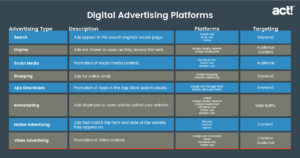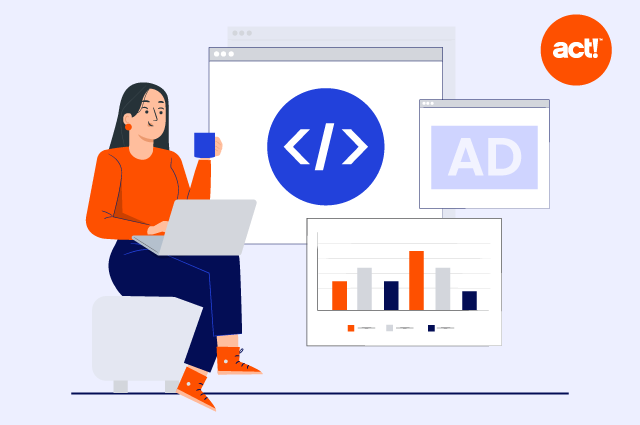
PPC marketing refers to Pay Per Click marketing. This involves setting up targeted ads for which you pay each time a potential customer clicks the ad.
Allowing advertisers to pay per visit to their page maximises the opportunity to create conversions or warm leads. This is opposed to a more traditional marketing strategies such as leaflet drops which could have little to no return on investment.
Throughout this article we will cover some of the main PPC networks and how to develop your initial PPC strategy. It is however important to keep in mind that each business and each product is different and this affects the PPC strategy. For example, the PPC strategy employed by a law firm will be entirely different to that used by a media production agency.
The advice given throughout this article will form a starting point from which you can base the future of your PPC campaigns.
Which PPC network is right for your business?
With a range of different PPC networks to choose from, it can be overwhelming to decide where to invest your marketing budget. Here we will cover the key platforms and advice on how to choose which one is right for you.
Google Ads
PPCprotect.com lists Google ads as the king of PPC. Regardless of the size of your business and your accompanying budget, Google ads provides opportunities for all. The reputation of the platform alone gives your PPC campaigns credibility. However, the major drawback of using Google ads for your PPC campaigns is the sheer competitiveness of the space. With millions of 3rd party websites accessing the service, it is vital that you utilise their keyword research tool to ensure that your ads will appear on the searches that your customer base make. Google Ads is the most well-known PPC platform but there are other platforms out there that might be a better fit based on your business or industry and may provide a better ROI. Some options include Bing Ads and Yahoo Ads which are direct competitors.
Social Media Platforms
Most Social Media platforms now allow advertisers to run paid social ads by targeting specific audiences. These include Facebook Ads, Twitter Ads, LinkedIn Ads and YouTube ads. Of course here you need to select the social media platform where your audience spends their time. Facebook has unparalleled popularity and is one of the top 3 visited websites in 2019 according to a study performed by lifewire.com. Facebook ads is a great place to post your ads in front of your customers. 1.56 billion users access Facebook daily, meaning that your list of potential clients is almost definitely on the platform, regardless of their age or location. Through specific targeting metrics using information from user’s Facebook pages, you can target key areas, niches, age ranges and even hobbies. As Facebook ads are directly embedded into the newsfeed, there are few better ways to place your ads directly in front of your customer base.
Bidvertiser
Bidvertiser is a much cheaper alternative to Google ads and provides an alternative PPC network. By placing your ads on the many 3rd party websites they connect with, they keep the cost of your advertisements down but unfortunately, this decreases the amount of revenue that the 3rd parties earn. If your budget is quite low or you are unable to access any of the other PPC networks, Bidvertiser is an option.

Your PPC campaign strategy
The first thing that you should consider when creating your PPC campaign strategy is just that, it is a campaign and thus requires sufficient planning. You must be aware of what your goal is from the PPC campaign. Are you trying to create direct conversions i.e. the purchase of your product? Or are you trying to raise awareness for your business and bring it to the forefront of people’s minds? The answers to these questions will influence your overall campaign, so it’s important to agree upon your goal beforehand.
Now that you are aware what it is that you want to achieve, you have to lay out your target audience. The majority of major PPC networks allow you to target specific groups of people, Facebook in particular does this very well so we will use it for our example moving forward.
Targeting your customers
Consider a local business with an audience of mostly elderly people aged 50 upwards. This consumer base does exist on Facebook so it’s a good option for your PPC network. Knowing their ages and the area in which they reside, you already have the main element of your targeting set up. Then you can delve into further detail regarding your business, what would a customer of your business be interested in? By accurately targeting this group, you won’t waste any of your budget on those who have no interest in your services. Thus, are more likely to achieve the goals which you laid out earlier.
Setting a budget
From there, your PPC network will inform you how much each click will cost you, this can range from £0.02 to £50. More competitive keywords cost more to invest in as they are typically reserved to businesses where £50 to bring a customer to your page has real value. It is important to now set a budget with the cost of your clicks in mind, a smaller business will almost definitely have a lower budget but potentially also benefit more from each click. For example, if you pay £2 per click but make upwards of £5 per customer clicking your ad, you will already see the profits. But setting a strict budget will prevent you from spending a lot of money if your ads are not converting.
Conclusion
PPC is an incredibly complex subject. Larger companies pay agencies to run their campaigns via computers that calculate where to target the ads and how much to spend. Smaller more local businesses manually set their targeting through their knowledge of their customers and seek to increase their conversions that way.
The best way to start your PPC marketing strategy is to follow the advice provided throughout this article and observe the results of beginning with a small budget. From there you can expand your PPC campaign in the way that benefits you and your business best. Whether that involves increasing your click budget per day or expanding the range of audience you target as your business grows. Ensure that you study PPC along the way to keep up with the latest trends and to see which network is the best for your business at any given time.
Want to learn more about optimising your marketing strategy and boosting your bottom line? Click to learn more about Marketing Automation.





